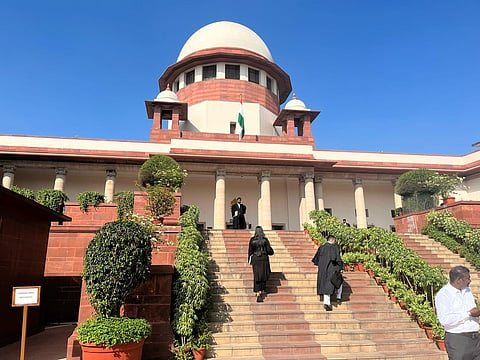

The Constitution bench comprising five judges of the Supreme Court headed by the outgoing Chief Justice of India, UU Lalit, delivered its judgment Monday on the constitutionality of the Constitution (103rd) Amendment, which provided for reservation of up to 10% for the Economically Weaker Section (EWS) of the society. The bench upheld the constitutionality of the said Amendment by a 3:2 majority. Justices Dinesh Maheshwari, Bela Trivedi and JB Pardiwala, delivered the majority opinion, and Justice Ravindra Bhat, with Chief Justice Lalit, delivered the minority opinion.
The challenge to the Amendment before the top court was broadly on three specific issues.
First, whether the 103rd Constitution Amendment is violative of the basic structure for providing reservation solely on the basis of economic criteria.
Secondly, whether the Amendment is violative of the basic structure for excluding the poor among the SC/ST/OBC categories from EWS Quota.
Finally, whether the Amendment is violative of the basic structure for breaching the 50% ceiling limit.
The petitioners had argued before the bench that allowing the Amendment would alter the entire idea of reservation as conceptualised in the Constitution, wherein reservation in education and public employment has been provided for as a tool for representation of disadvantaged groups and not as a means for economic empowerment.
The petitioners had further argued that the exclusion of the Socially and Economically Backward Classes, i.e., Scheduled Tribes, Scheduled Castes and Other Backward Classes of the society, from the EWS quota was violative of the basic structure of the Constitution as it ran contrary to the principles of equality and social justice.
It was also argued that economic criteria could not be the sole factor to determine backwardness and that the 50% limit on the reservation, as propounded in the Indra Sawhney v. Union of India and R Balaji vs Union of India, was sacrosanct and could not be tampered with.
The Union of India had countered the arguments stating that the 50% threshold could be surpassed in exceptional circumstances, and in this case, it was done so to reduce widespread poverty among people who are not already aided by reservations within the 50% limit.
The majority of the judges were inclined to agree with the government's view. They held that the Amendment did not violate the essential features or the basic structure of the Constitution as was enshrined in the Keshavananda Bharati judgment. They also held that the 50% limit on reservations has always been flexible and is limited to reservations under Article 15(4), 15(5) and 16(4) for Socially and Economically Backward Classes. With the help of the majority judgment, States will now be able to make decisions concerning public employment and educational institutions based solely on economic considerations.
However, it was the minority opinion, authored by Justice Ravindra Bhat and concurred with by outgoing Chief Justice UU Lalit, that raises certain interesting and significant questions and will be important for the Republic in the future while it decides the path to social and economic empowerment of those who are disadvantaged.
The minority opinion states that the classification as enshrined under the 103rd Amendment to the Constitution runs contrary to the essence of equal opportunity. It further states that the exclusion of backward classes from any kind of reservation is impermissible and that if such an amendment is legitimised, it would mean practising a "constitutionally prohibited form of discrimination".
The court's understanding comes from the fact that the bulk of the poor, even today in this country, come from the SC/ST/OBC and excluding them from the EWS quota would not satisfy the very objective of the 103rd Amendment and is, therefore, arbitrary and discriminatory. It is important to understand this reasoning, as the language of the Indian Constitution isn't exclusionary, and, therefore, any amendment that legitimises exclusion of the disadvantaged group would only take us away from the goals enshrined within that text.
The minority opinion further holds that breaching the 50% limit would lead to compartmentalisation and would open gateways for further infractions. Justice Bhat, in his opinion, clearly remarks that if such an act were permitted, then the rule of equality would be reduced to the right of reservation. He also stated that reservations are to be seen as temporary and exceptional and cannot be granted as a norm by the state as that would run the risk of eating up the rule of equality.
The above remarks from the minority opinion are significant as they directly challenge the very presumptions of the majority opinion. It is true that reservations can and should certainly be granted on the basis of Economic Criteria alone, but purposefully ousting a huge section of the population that would otherwise form a part of this very class is clearly contrary to the very aim that the Amendment seeks to achieve. Does the majority opinion, therefore, open the floodgates for similar demands?
Anurag Tiwary is a Delhi-based lawyer and Bhavya Singh is a UN Millenium Fellow 2022